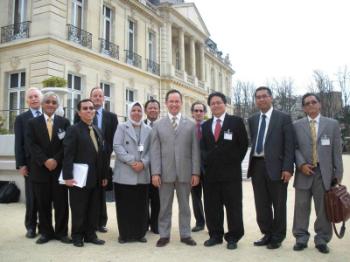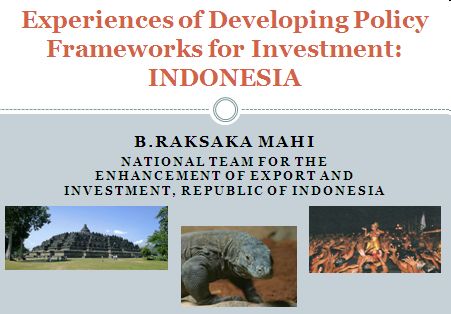Indonesia
Indonesia and the Policy Framework for Investment
|
The PFI process The investment climate in Indonesia was examined using the Policy Framework for Investment (PFI). The process involved extensive collaboration between the OECD and Government of Indonesia who created a multi-agency Task Force to prepare detailed answers to the PFI questions and to provide support to the process.
|
This PowerPoint presentation by B.Raksaka Mahi, National Team for the Enhancement of Export and Investment, Republic of Indonesia, sets out the background and strategy behind the Indonesian government's decision to use the Policy Framework for Investment
|

Officials from the Government of Indonesia and the OECD on the occasion of the peer review of Indonesia's investment policies which took place in March 2010 at OECD headquarters in Paris. |
The Government of Indonesia can also use the PFI assessment exercise to help build consensus and capacity within government and to foster a whole-of-government approach to investment climate reform.
Context Indonesia has undertaken a decade of political and economic reform, under very difficult circumstances. Democracy is now firmly established, and the economy is growing at a steady pace. Indonesia has been one of the fastest growing economies among the G20 during the current global financial crisis. Foreign direct investment inflows into Indonesia have fallen since the last quarter of 2008 – in line with global flows – but remain high by the standards of the past decade. Reforms over the past decade have done much to improve the resilience of the Indonesian economy, and the government has made substantial progress to create a better climate for investment. New laws have been enacted in almost all sectors, sometimes replacing legislation that had been in place since the 1960s. New institutions have also been created to advise the government, implement and enforce laws, regulate newly-liberalised sectors and settle disputes.
At the same time, investment inflows are still below their potential, particularly in labour-intensive and export-oriented manufacturing. Undertaking a PFI assessment is seen by the Government of Indonesia as a way of improving both investment policies themselves and the way in which they are formulated. It is also hoped that the review will provide an independent assessment of the status of reforms which could be used to showcase how much has already been achieved and to counter the persistent negative external perception of the investment climate in Indonesia. |
Related Documents
